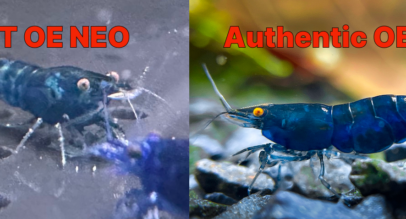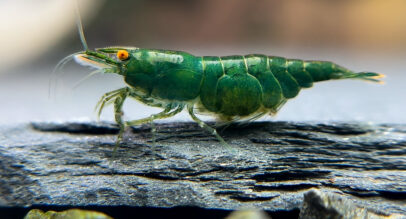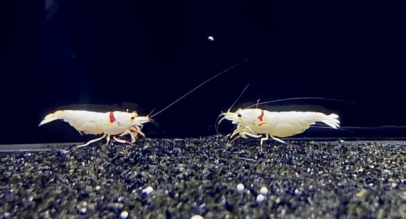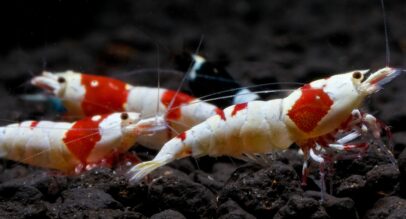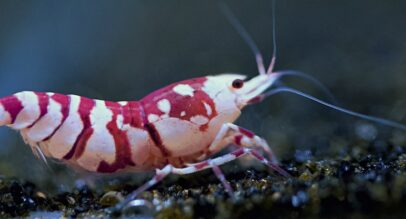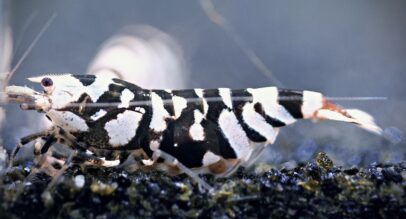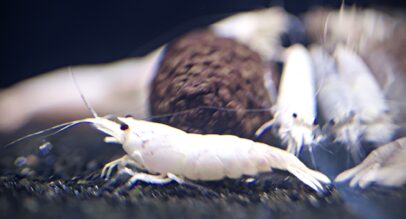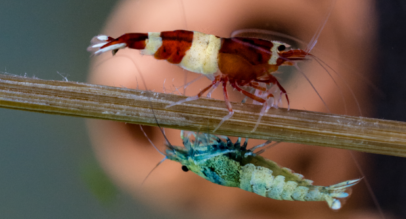Proper stocking is crucial for maintaining a healthy and thriving shrimp aquarium. When it comes to Caridina Wine Red shrimp, also known as Crystal Red shrimp, understanding their tank size requirements is essential for their well-being and successful breeding. In this article, we’ll explore the factors that affect shrimp density and provide guidelines for appropriate tank sizes.
Importance of proper stocking in shrimp tanks
Maintaining the right number of shrimp in your tank is vital for several reasons:
- Water quality: Overstocking can lead to rapid deterioration of water quality, as more shrimp produce more waste. Poor water quality can stress shrimp, making them more susceptible to diseases and reducing their lifespan.
- Competition for resources: Too many shrimp in a limited space can result in increased competition for food and hiding spots, potentially leading to stunted growth or aggression.
- Breeding success: Proper stocking density allows for optimal breeding conditions, ensuring that females have enough space to carry and release their eggs without excessive stress.
- Overall health: A well-stocked tank promotes better overall health for your shrimp, reducing stress and allowing them to exhibit natural behaviors.
Factors affecting shrimp density
Several factors influence the number of Caridina Wine Red shrimp you can keep in a tank:
- Tank size: The most obvious factor is the volume of water available. Larger tanks can support more shrimp, providing a more stable environment.
- Filtration efficiency: A robust filtration system can process more waste, potentially allowing for slightly higher stocking densities.
- Plant density: Heavily planted tanks provide more surface area for beneficial bacteria and additional grazing opportunities, which can support a higher shrimp population.
- Feeding regimen: Proper feeding practices can help maintain water quality and support a healthy shrimp population.
- Age and size of shrimp: Juvenile shrimp require less space than adults, but keep in mind that they will grow over time.
- Presence of other tank inhabitants: If you’re keeping other species in the tank, this will reduce the number of shrimp you can safely maintain.
Understanding these factors is crucial for determining the appropriate tank size for your Caridina Wine Red shrimp. In the following sections, we’ll provide specific recommendations for tank sizes based on the number of shrimp you wish to keep.
General Guidelines for Shrimp Stocking
When it comes to stocking Caridina Wine Red shrimp, also known as Crystal Red shrimp, it’s essential to follow some general guidelines to ensure a healthy and thriving colony. While these guidelines are not set in stone, they provide a good starting point for both beginners and experienced shrimp keepers.
Basic rule of thumb for beginners
For those new to keeping Caridina Wine Red shrimp, here’s a simple rule of thumb to follow:
- 2-5 shrimp per gallon for tanks under 20 gallons
- 5-10 shrimp per gallon for larger tanks (20+ gallons)
These guidelines provide a conservative approach that helps maintain good water quality and reduces the risk of overstocking. For example, in a 10-gallon tank, you could start with 20-50 shrimp, while a 30-gallon tank could potentially house 150-300 shrimp.
Differences between Neocaridina and Caridina Wine Red shrimp stocking rates
It’s important to note that Caridina Wine Red shrimp have slightly different requirements compared to their Neocaridina cousins (like Red Cherry shrimp):
- Caridina shrimp are generally more sensitive to water parameters and may require lower stocking densities.
- Caridina Wine Red shrimp tend to be slightly smaller than most Neocaridina species, potentially allowing for slightly higher stocking rates in some cases.
- Caridina shrimp often have more specific water parameter requirements, which can impact the tank’s overall bioload capacity.
Why it depends
While these guidelines provide a good starting point, the actual number of shrimp your tank can support depends on various factors:
- Filtration efficiency
- Plant density
- Maintenance routine
- Feeding habits
- Individual tank ecosystem
Always monitor your tank closely and be prepared to adjust your stocking levels based on the specific conditions in your aquarium.
Minimum Tank Size Requirements for Caridina Wine Red Shrimp
General recommendations for beginners
For those just starting with Caridina Wine Red shrimp, here are the general tank size recommendations:
- Recommended minimum: 10 gallons (38 liters)
- Absolute minimum: 5 gallons (19 liters)
A 10-gallon tank is recommended for beginners because:
- It provides a more stable environment with less rapid fluctuation in water parameters.
- It allows for a larger colony, increasing the chances of successful breeding.
- It offers more space for aquascaping, hiding spots, and plant growth.
- It’s easier to maintain stable water chemistry in a larger volume of water.
While a 5-gallon tank is possible for experienced shrimp keepers, it’s generally not recommended for beginners due to:
- Rapid changes in water parameters that can stress or harm the shrimp
- Limited space for a growing colony
- Increased difficulty in maintaining stable water conditions
Remember, these are minimum recommendations. Larger tanks will always provide a more stable and comfortable environment for your Caridina Wine Red shrimp, allowing for larger colonies and more dynamic aquascapes.
Setting Up Different Sized Caridina Wine Red Tanks
The size of your tank will significantly influence how you set it up and how many Caridina Wine Red shrimp you can keep. Let’s explore different tank size options and their characteristics:
5-10 gallon setups
These smaller tanks are suitable for beginners or those with limited space:
- Ideal for 10-50 shrimp
- Require careful monitoring of water parameters
- Best suited for single-species setups
- Limited aquascaping options
- Recommend using a sponge filter to avoid shrimp loss
- Regular small water changes (10-15% weekly) are crucial
20-30 gallon setups
Medium-sized tanks offer more stability and flexibility:
- Can house 100-300 shrimp comfortably
- Allow for more diverse aquascaping
- Provide space for larger filtration systems
- Easier to maintain stable water parameters
- Suitable for breeding projects
- Can potentially accommodate other compatible species
40+ gallon setups
Large tanks provide the most stable environment for Caridina Wine Red shrimp:
- Can support 200-600+ shrimp
- Offer extensive aquascaping possibilities
- Allow for multiple colonies or color variations
- Provide the most stable water parameters
- Ideal for serious breeding projects
- Can accommodate a variety of plant species and hardscape elements
Factors Influencing Tank Size Choice
When deciding on the right tank size for your Caridina Wine Red shrimp, consider the following factors:
Number of shrimp in the colony
- Larger colonies require more space to thrive
- Consider future growth when choosing tank size
- Remember the stocking guidelines mentioned earlier
Breeding intentions
- Serious breeding projects benefit from larger tanks
- More space allows for better separation of generations
- Larger tanks provide more stable conditions for berried females and shrimplets
Water parameter stability
- Larger volumes of water are inherently more stable
- Smaller tanks require more frequent maintenance to maintain stability
- Consider your experience level and time availability for maintenance
Aquascaping plans
- Larger tanks offer more creative possibilities
- Complex aquascapes with various plants and hardscape elements need more space
- Consider the mature size of plants when planning your layout
Available space and budget
- Ensure you have adequate space for your chosen tank size
- Larger tanks require more powerful (and often more expensive) equipment
- Factor in ongoing costs such as electricity, water treatments, and maintenance supplies
When choosing your tank size, it’s essential to balance your goals for your Caridina Wine Red shrimp colony with practical considerations. While larger tanks offer more stability and flexibility, they also require more resources and space. Conversely, smaller tanks can be perfect for those just starting out or with limited space, but they demand more attention to maintain optimal conditions.
Ultimately, the best tank size for your Caridina Wine Red shrimp will depend on your specific circumstances and goals. Whichever size you choose, remember that proper setup, maintenance, and care are key to a thriving shrimp colony.
Benefits of Larger Tanks for Caridina Wine Red Shrimp
While Caridina Wine Red shrimp can be kept in smaller tanks, larger aquariums offer several advantages that can significantly improve the health and well-being of your shrimp colony:
Improved water quality and stability
Larger tanks provide a greater volume of water, which helps to:
- Dilute waste products more effectively
- Buffer against sudden changes in temperature and chemistry
- Maintain more consistent parameters over time
- Reduce the impact of evaporation on water chemistry
More space for hiding and foraging
With increased tank size, you can create a more diverse environment:
- Add more plants, driftwood, and rocks for hiding spots
- Create varied substrate areas for different foraging experiences
- Establish distinct zones for feeding, molting, and breeding
Better opportunities for natural behaviors
A larger tank allows shrimp to exhibit more natural behaviors:
- Form smaller social groups within the larger colony
- Engage in mating rituals without overcrowding
- Explore a more varied environment, promoting activity and enrichment
Easier maintenance and parameter control
Maintaining a larger tank can actually be easier in some ways:
- Less frequent water changes may be needed (though still regular)
- Parameters tend to shift more slowly, giving you more time to react
- Easier to establish a stable nitrogen cycle
- More room for efficient filtration systems
Challenges of Smaller Tanks
While smaller tanks can be suitable for Caridina Wine Red shrimp, they come with their own set of challenges that keepers should be aware of:
Rapid parameter fluctuations
Small water volumes are more susceptible to quick changes:
- Temperature can fluctuate more rapidly
- pH and other chemical parameters can shift suddenly
- Waste products can accumulate more quickly
- Evaporation can have a more significant impact on water chemistry
Limited space for population growth
Restricted space can lead to issues as your colony grows:
- Overcrowding can occur more quickly
- Less room for shrimplets to hide from adults
- Potential for increased competition for resources
Increased stress on shrimp
A smaller environment can be more stressful for shrimp:
- Less room to escape aggressive individuals
- Fewer hiding spots during molting periods
- Higher likelihood of territorial disputes
- Potential for more frequent disturbances during maintenance
Higher maintenance requirements
Smaller tanks often require more frequent and careful maintenance:
- More frequent water changes to maintain water quality
- Need for more precise dosing of additives and fertilizers
- Closer monitoring of water parameters required
- Less room for error in feeding (overfeeding can quickly lead to problems)
While these challenges don’t make smaller tanks impossible for Caridina Wine Red shrimp, they do require more attention and careful management. Beginners might find it easier to start with a larger tank to provide a more stable environment as they learn the nuances of shrimp keeping.
Regardless of the tank size you choose, the key to success with Caridina Wine Red shrimp lies in understanding their needs, maintaining consistent water parameters, and providing a well-balanced environment. With proper care and attention, these beautiful shrimp can thrive in a range of tank sizes, bringing color and activity to your aquatic display.
Signs of Overstocking
Recognizing the signs of overstocking is crucial for maintaining a healthy Caridina Wine Red shrimp colony. Here are some key indicators to watch for:
Water quality issues
Overstocked tanks often experience rapid deterioration of water quality:
- Ammonia and nitrite spikes, even with regular maintenance
- Nitrate levels that rise quickly between water changes
- Cloudy water that persists despite filtration
- Algae blooms that are difficult to control
- Foul odors coming from the tank
Increased aggression or stress
While Caridina Wine Red shrimp are generally peaceful, overcrowding can lead to behavioral changes:
- Shrimp constantly swimming at the water surface (known as “surfing”)
- Increased instances of shrimp “attacking” or climbing over each other
- More frequent molting, often with incomplete or problematic molts
- Shrimp hiding excessively, especially during feeding times
Reduced breeding
Overstocking can negatively impact the reproductive success of your colony:
- Fewer berried (egg-carrying) females observed
- Smaller clutch sizes when females do become berried
- Higher mortality rates among newly hatched shrimplets
- Slower growth rates in juvenile shrimp
If you notice these signs, it’s important to take action. This might involve increasing maintenance, removing some shrimp, or upgrading to a larger tank.
Scaling Up: When and How to Upgrade Your Caridina Wine Red Tank
Tips for safely transferring Caridina Wine Red to a larger tank
When it’s time to move your shrimp to a larger home, follow these guidelines:
- Prepare the new tank in advance:
- Cycle the new tank fully before adding shrimp
- Match water parameters as closely as possible to the old tank
- Add plenty of plants and hiding spots
- Acclimate shrimp carefully:
- Use the drip acclimation method over 1-2 hours
- Float the bag with shrimp in the new tank to equalize the temperature
- Transfer decor and filter media:
- Move some decorations from the old tank to provide familiar surfaces
- Transfer some filter media to seed the new tank with beneficial bacteria
- Monitor closely after transfer:
- Check water parameters daily for the first week
- Observe shrimp behavior for signs of stress
- Maintain consistent feeding:
- Keep the same feeding schedule and amounts initially
- Gradually increase food as the colony grows
Gradual colony expansion strategies
To ensure a smooth transition and healthy growth of your Caridina Wine Red colony:
- Start with a core group:
- Begin with a small, established group in the new tank
- This allows you to fine-tune parameters before adding more shrimp
- Add shrimp in batches:
- Introduce new shrimp in small groups every few weeks
- This prevents overwhelming the bioload of the new tank
- Allow natural breeding:
- Once established, let the colony grow through breeding
- This ensures shrimp are well-adapted to the new environment
- Cull selectively:
- Remove lower-grade shrimp to maintain color quality
- This also helps control population growth
- Expand plant cover gradually:
- Add new plants over time as the colony grows
- This provides more surface area for biofilm, a crucial food source
- Adjust filtration as needed:
- Increase filter capacity as the colony expands
- Consider adding supplementary filters for larger tanks
Remember, patience is key when scaling up your Caridina Wine Red shrimp tank. Gradual changes and close observation will help ensure a successful transition and a thriving, larger colony in your new setup.

